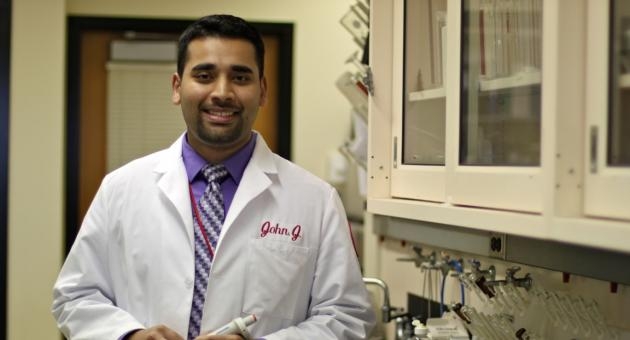Pharmacy student makes time for research

For most students in Temple’s Doctor of Pharmacy program, the intense curriculum of classroom study and outside pharmacy experiences leaves little time for other things, including independent research.
But that didn’t stop Joel John, who is receiving his Pharm.D. degree from Temple’s School of Pharmacy on May 17.
John has spent the past four years examining the effects of drugs on learning and memory, with the long-term goal of providing a model to test new drugs that can improve memory in patients with dementia or Alzheimer's disease. He’s worked in the behavioral pharmacology lab of Ellen Walker, professor of pharmaceutical sciences.
John, whose mother encouraged him to pursue a career in pharmacy, never thought that research would be part of his experience when he came to Temple from State University of New York at Buffalo, where he earned his bachelor’s degree in pharmacology and toxicology. But one of his first classes — “Anatomy and Physiology” — was taught by Walker, who described to the class the work being done in her lab.
“I went to her lab and actually talked to her about her work,” said John. “They were studying the effects of chemotherapeutic agents on learning and memory. As a pharmacy student, it was really interesting to see the drugs being tested in a pre-clinical setting.
“When I started in the lab, there was another lab testing a compound and their effects on substance addiction,” he said. “They wanted to see if these compounds had any effect on learning and memory.”
Although John’s schedule was already full, Walker allowed him the flexibility to begin doing research in her lab.
“Pharmacy school itself is a lot of time, but I was able to find time between my classes and outside experiences,” John said. “As long as you keep the time to run your experiments very consistent, you will be fine.”
John often worked by himself in the lab late evenings once the graduate students and research assistants went home. He would start around 6 p.m. and often worked on his experiments until 10 or 11 o’clock.
“I really didn’t mind staying late at night,” said John, who at one point was juggling his classes, two pharmacy experiences and his research. “For me, it was easy to manage the time, and the lab team I worked with was very accommodating, which made my work stress free and fun. I also live close by the school, so that helped greatly.”
Most pharmacy students have the opportunity to attend professional meetings, such as the meeting of the American Pharmacists Association. But John was able to present his research work at several neuroscience and pharmacology conferences.
“It was unique to me because there were no other pharmacy students,” he said. “Here I am a pharmacy student at these conferences with a research poster.”
John was first author or co-author on 10 local, regional and national poster presentations at various conferences, and one of his posters won first prize in behavioral pharmacology at the San Diego meeting of the American Society for Pharmacology and Experimental Therapeutics in April 2012.
“Everything just fell into the right place at the right time for me,” said John, who will begin a per diem pharmacy position at Temple Hospital following graduation. “And talking to the right people gave me these wonderful research opportunities.
“Dr. Walker has been a great mentor to me,” he added. “She gave me a lot of great opportunities and I feel very fortunate to have worked with such a wonderful group both in research and academia.”